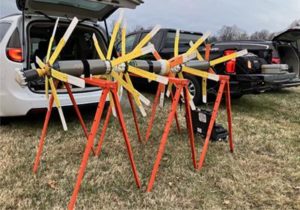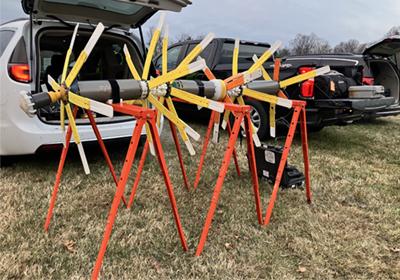 Frigid temperatures didn’t keep a six-foot robot from making a splash in one of Louisville Water’s large water mains.
Frigid temperatures didn’t keep a six-foot robot from making a splash in one of Louisville Water’s large water mains.
Early Thursday morning, crews from Louisville Water and Pure Technologies gathered at the B.E. Payne Water Treatment Plant in Prospect, to prepare PipeDiver® for its 11-mile trek through a 60-inch water main.
Using technology and robotic devices to inspect large water mains helps Louisville Water maintain its 4,200 miles of pipes. A big advantage of the technology is that the inspection happens inside the water main while it’s filled with water, meaning there is no interruption in service and no traffic impact due to large pieces of equipment in the road.
The flow of the water is what propels PipeDiver through the pipe system. The device sends electromagnetic signals that record the condition of the pipe and identify potential areas for repair.
“Using robotic technology like this is a gamechanger for the water industry. Until about 20 years ago, we had to wait until the pipe broke to really know there was a problem. Louisville Water started using this type of technology around 10 years ago. Since then, we’ve been able to identify and repair more than 200 places in water mains that needed to be repaired,” said Kelley Dearing Smith, Louisville Water’s Vice President of Communications.
Crews watched on a monitor as PipeDiver travelled in real-time. There were dozens of checkpoints along the inspection route which ended at a water storage tank along North English Station Road.
This particular water main, which serves a large portion of eastern Jefferson County, was first inspected by robotic technology more than 10 years. Our engineering team reinspected it to get a better scope of how long minor repairs held up and if any deterioration occurred over time.
“This technology and the way that the water company uses it just gives a tremendous insight into the health of their transmission main and the ability to proactively manage it. It puts the water company and their customers in a really advantageous position. To be able to avoid those failures that you sometimes hear about on the news,” said Bill Barloon, Pure Technologies Manager of Project Management.
Several hours after PipeDiver began its inspection, Louisville Water Project Engineer David Mulloy said they successfully retrieved it from the main. “PipeDiver completed its 11.2 mile, cross-county journey just before sunset Thursday without issue or interruption to Louisville Water customers. In other words, it went swimmingly.”
Barloon says it will take about a month and a half to two months to fully analyze the data that PipeDiver collected.
Louisville Water dedicates the largest percentage of its capital budget to build and maintain its infrastructure. The programs for small and large water mains are considered best-practices by others in the water industry.


